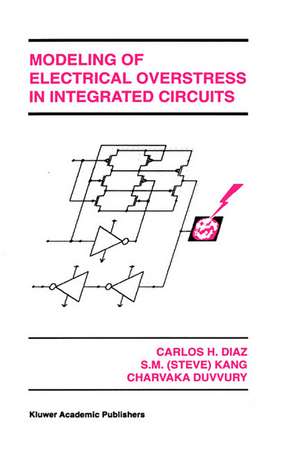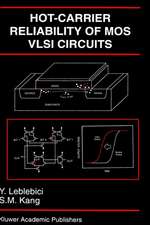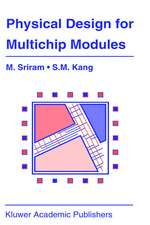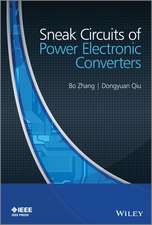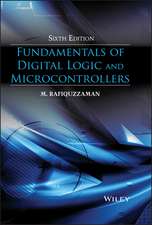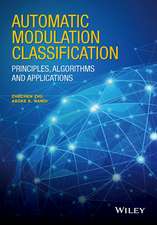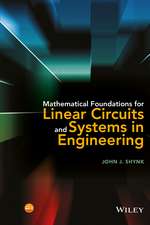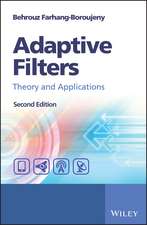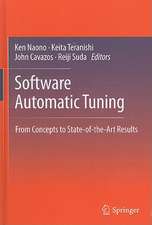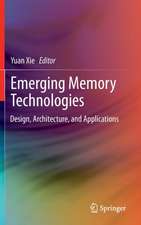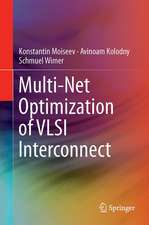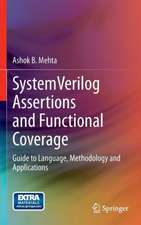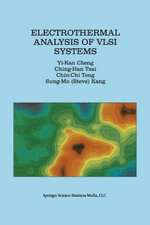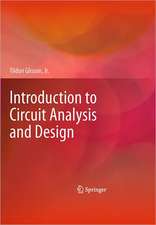Modeling of Electrical Overstress in Integrated Circuits: The Springer International Series in Engineering and Computer Science, cartea 289
Autor Carlos H. Diaz, Sung-Mo (Steve) Kang, Charvaka Duvvuryen Limba Engleză Hardback – 30 noi 1994
The design of I/O protection circuits has been done in a hit-or-miss way due to the lack of systematic analysis tools and concrete design guidelines. In general, the development of on-chip protection structures is a lengthy expensive iterative process that involves tester design, fabrication, testing and redesign. When the technology is changed, the same process has to be repeated almost entirely. This can be attributed to the lack of efficient CAD tools capable of simulating the device behavior up to the onset of failure which is a 3-D electrothermal problem. For these reasons, it is important to develop and use an adequate measure of the EOS robustness of integrated circuits in order to address the on-chip EOS protection issue. Fundamental understanding of the physical phenomena leading to device failures under ESD/EOS events is needed for the development of device models and CAD tools that can efficiently describe the device behavior up to the onset of thermal failure.
Modeling of Electrical Overstress in Integrated Circuits is for VLSI designers and reliability engineers, particularly those who are working on the development of EOS/ESD analysis tools. CAD engineers working on development of circuit level and device level electrothermal simulators will also benefit from the material covered. This book will also be of interest to researchers and first and second year graduate students working in semiconductor devices and IC reliability fields.
| Toate formatele și edițiile | Preț | Express |
|---|---|---|
| Paperback (1) | 939.00 lei 6-8 săpt. | |
| Springer Us – 27 sep 2012 | 939.00 lei 6-8 săpt. | |
| Hardback (1) | 943.73 lei 6-8 săpt. | |
| Springer Us – 30 noi 1994 | 943.73 lei 6-8 săpt. |
Din seria The Springer International Series in Engineering and Computer Science
- 24%
 Preț: 1041.97 lei
Preț: 1041.97 lei - 20%
 Preț: 643.50 lei
Preț: 643.50 lei - 18%
 Preț: 1225.62 lei
Preț: 1225.62 lei - 18%
 Preț: 965.02 lei
Preț: 965.02 lei - 20%
 Preț: 646.12 lei
Preț: 646.12 lei - 18%
 Preț: 948.79 lei
Preț: 948.79 lei - 20%
 Preț: 646.62 lei
Preț: 646.62 lei - 15%
 Preț: 637.46 lei
Preț: 637.46 lei - 20%
 Preț: 643.83 lei
Preț: 643.83 lei - 18%
 Preț: 949.23 lei
Preț: 949.23 lei - 20%
 Preț: 644.48 lei
Preț: 644.48 lei - 20%
 Preț: 994.92 lei
Preț: 994.92 lei - 20%
 Preț: 645.97 lei
Preț: 645.97 lei - 18%
 Preț: 946.87 lei
Preț: 946.87 lei - 20%
 Preț: 995.57 lei
Preț: 995.57 lei - 18%
 Preț: 956.99 lei
Preț: 956.99 lei - 20%
 Preț: 644.98 lei
Preț: 644.98 lei - 15%
 Preț: 649.54 lei
Preț: 649.54 lei - 18%
 Preț: 950.21 lei
Preț: 950.21 lei - 18%
 Preț: 1221.38 lei
Preț: 1221.38 lei - 18%
 Preț: 957.62 lei
Preț: 957.62 lei - 15%
 Preț: 643.99 lei
Preț: 643.99 lei - 18%
 Preț: 948.47 lei
Preț: 948.47 lei - 18%
 Preț: 947.35 lei
Preț: 947.35 lei - 20%
 Preț: 1284.65 lei
Preț: 1284.65 lei - 20%
 Preț: 1633.95 lei
Preț: 1633.95 lei - 20%
 Preț: 1285.78 lei
Preț: 1285.78 lei
Preț: 943.73 lei
Preț vechi: 1150.89 lei
-18% Nou
Puncte Express: 1416
Preț estimativ în valută:
180.63€ • 187.86$ • 151.37£
180.63€ • 187.86$ • 151.37£
Carte tipărită la comandă
Livrare economică 13-27 martie
Preluare comenzi: 021 569.72.76
Specificații
ISBN-13: 9780792395058
ISBN-10: 0792395050
Pagini: 148
Ilustrații: XXV, 148 p.
Dimensiuni: 155 x 235 x 16 mm
Greutate: 0.4 kg
Ediția:1995
Editura: Springer Us
Colecția Springer
Seria The Springer International Series in Engineering and Computer Science
Locul publicării:New York, NY, United States
ISBN-10: 0792395050
Pagini: 148
Ilustrații: XXV, 148 p.
Dimensiuni: 155 x 235 x 16 mm
Greutate: 0.4 kg
Ediția:1995
Editura: Springer Us
Colecția Springer
Seria The Springer International Series in Engineering and Computer Science
Locul publicării:New York, NY, United States
Public țintă
ResearchCuprins
1 Electrical Overstress in ICS.- 1.1 Definition of Electrostatic Discharge Phenomena.- 1.2 Impact of ESD on IC Chip Technologies.- 1.3 Protection Strategies for Reducing ESD Effects.- 1.4 ESD Models and Qualification.- 1.5 EOS Models and Qualification.- 1.6 Previous Work on ESD/EOS Device Failure Modeling.- 2 NMOS ESD Protection Devices and Process Related Issues.- 2.1 ESD Phenomena in nMOS Devices.- 2.2 Failure Modes in nMOS.- 2.3 Protection Technique Using nMOS Device Structures.- 2.4 The Impact of Process Technologies on nMOS ESD Behavior.- 2.5 Advance nMOS Device Protection Concepts.- 3 Measuring EOS Robustness in ICS.- 3.1 Statistical Distribution of EOS/ESD-related Failures.- 3.2 Characterization of Bipolar Devices.- 3.3 EOS Characterization of nMOS Devices.- 3.4 Summary.- 4 Eos Thermal Failure Simulation for Integrated Circuits.- 4.1 Nomenclature.- 4.2 ITSIM: A Nonlinear Thermal Failure Simulator for ICs.- 4.3 Simulation Results for Ceramic and Plastic Packages.- 4.4 Summary.- 5 ITSIM: A Nonlinear 2D - 1D Thermal Simulator.- 5.1 Introduction.- 5.2 Running the Program.- 5.3 Input File.- 5.4 An Example.- 6 2D Electrothermal Analysis of Device Failure in Mos Processes.- 6.1 Device Level Electrothermal Simulation.- 6.2 Comparison of Experimental and 2D Electrothermal Results.- 6.3 Summary.- 7 Circuit-Level Electrothermal Simulation.- 7.1 Temperature Effects and Device Models.- 7.2 Simulation of Avalanche Breakdown.- 7.3 Temperature Model for Electrothermal Simulation.- 7.4 iETSIM: An Electrothermal Circuit-Level Simulation Tool.- 7.5 Summary.- 8 IETSIM : An Electrothermal Circuit Simulator.- 8.1 Introduction.- 8.2 Running the Program.- 8.3 Input File: Circuit Description and Format.- 8.4 Low Temperature Thermometer Example.- 9 Summary and Future Research.- 9.1 Summary.- 9.2 Future Research.- About the Authors.
